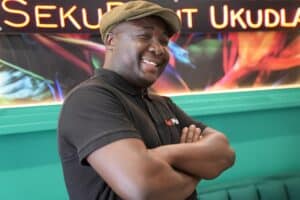South Africans needed a good message because as a nation, it faced several serious challenges 'politically, economically and socially'.

And united we shall stand as millions of fans in South Africa and abroad passionately celebrated the Springboks’ Rugby World Cup final win on Saturday night, once again bringing hope and unity to an increasingly divided country.
Bok captain Siya Kolisi said the Boks were inspired to make history by the people of SA.
In an on-field post-match interview, he explained how important the win was not only for the team but for a struggling country.
WATCH: ‘They don’t understand what this means for SA’ – Siya Kolisi
“I don’t think that people who aren’t from South Africa understand what this means for our country. It’s not just about the game on the field. Our country goes through so much and we are the hope that they have.
“We are just grateful that we can be here. I just want to tell the people of South Africa thank you so much. For children from a Third World country that just fight and fight over and over. For people who need hope.”
‘Bring the nation together’
Young and old gathered in their numbers to support the Boks in their homes, fan parks, malls and restaurants around the country.
Thabile Khumalo, 24, from just a national symbol of unity but have constantly showed up for SA as a nation when it counted most.
“They are genuinely great players. Rugby is a big sport in Model C and private schools. Most of the players were students groomed in our schools so we feel like we know them,” she said.
RELATED: Super Pieter-Steph du Toit tackles Boks to World Cup title: ‘An honour’
“Many people who love and understand rugby started from their school days. So maybe that’s why it’s appealing to young, educated youth.”
Tswelopele Makgale, 23, from Alberton, said the Springboks’ “ability to bring the nation together makes me identify with them. They stand for perseverance and hope. They serve as a reminder that resilience is essential and there is always hope, even in the midst of the challenges facing South Africa. I admire the group’s representation of diversity.”
Lethabo Malatji, 24, from Soweto said she identified with the Boks because they were deeply rooted in what the country fought and stood for.
Huge contribution towards nation-building
With the win indicating a sign of unity, North-West University political analyst Prof André Duvenhage said South Africans needed a good message because as a nation, it faced several serious challenges “politically, economically and socially”.
“We are experiencing some of the worst conflicts and polarisation. We have seen racially discriminatory legislation coming through the system,” he said.
Duvenhage said the rugby spirit was contrary to all these challenges facing the country.
“This win is very similar and maybe even more important than the 1995 win around Nelson Mandela. We needed this. We need to see that black, white and other colours can work together as a team,” he said.
“If there was a prize for contributing towards nation-building in South Africa, I would give it to Rassie Erasmus and the management of the Springbok team. I really think they made a huge contribution.
“I think we will see politicians playing into this because we are entering an election,” he added.
READ MORE: Boks’ World Cup triumph ‘for the fans, for South Africa,’ says Nienaber
“We need people not to be politically correct but to serve the general public interest. About 41% of people in South Africa cannot put enough food on the table.
“Millions are living in poverty and the economy is not growing. We need to change things. SA needs to reform in a fundamental way like we reformed back in the late ’80s.
“I think that is the challenge and hopefully, what happened on the rugby field can be a bit of an inspiring factor which contributes to constructive and positive change,” Duvenhage added.
Business Unity South Africa (BLSA) president Bonang Mohale said this was the victory the country needed.
He said if SA was serious about embedding, deepening and widening this hope, a lot more work was needed from every South African.
“Civil society’s job is to ensure that we continue to hold one another accountable, especially our politicians. As business, we need to continue to do well by doing good,” Mohale said.






